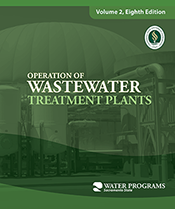Small Water System
Online courses feature guided reading assignments, self-assessment questions to help students check their understanding, interactive exercises, video clips, and online resources. The related training manual, Small Water System Operation and Maintenance, is sold separately.
Attention Texas and Washington operators:
Your states require your exams to be proctored and that an affidavit be signed by your proctor. After purchase, you will receive proctoring instructions.
Small Water System: Wells (702A)
This course teaches operators how to set up a wellhead protection program, identify parts of a well and pump system, maintain and rehabilitate a well, and operate and maintain a well pump and hydro-pneumatic pressure tank. Operators will learn how to inspect, keep accurate records, and troubleshoot problems in wells and pumping systems. This course also presents information on disinfecting wells and pumps, and removing sand from water mains. In addition, this course describes types of wells and drilling methods, and will teach operators how to select a well site, test and evaluate a well and pump, and abandon and plug a well that is no longer productive or needed.
1.8 CEUs (18 contact hours)
6th Edition
Course Time Limit: 3 months
Small Water System: Treatment Plants (702B)
This course teaches operators about treatment requirements and methods for surface water and groundwater; the coagulation, flocculation, sedimentation, filtration, and disinfection treatment processes for a surface water treatment plant; and how to create a corrosion control program to protect treatment and distribution infrastructure. Operators will also learn about solids-contact clarification and slow sand filter systems; iron and manganese removal and water softening processes to treat groundwater; and setting up effective maintenance and safety programs for a small water system.
1.8 CEUs (18 contact hours)
6th Edition
Course Time Limit: 3 months
Small Water System: Disinfection (702C)
This course teaches operators about the components of a water supply system from source to customer; the purpose of disinfection and its applicable regulations; factors influencing disinfection effectiveness; and the physical and chemical means of disinfection and critical factors affecting each. Operators also learn about disinfecting wells, pumps, mains, and tanks; operating different types of chlorination equipment; safely handling chlorine; calculating and setting chlorination dosing rates; measuring chlorine residual; and solving disinfection math problems.
1.8 CEUs (18 contact hours)
6th Edition
Course Time Limit: 3 months
Small Water System: Safety and Introduction to Small System Management (702D)
This course teaches operators how to develop and implement a worker safety program for water treatment and distribution facilities, including how to properly use safety equipment; employ safe practices around wells, pumps, and water storage facilities; work safely in streets, trenches, and confined spaces with lockout/tagout procedures; and conduct safety inspections. Small system management topics introduce operators to developing utility water rates, determining revenue requirements, applying cost allocation methods, and calculating the distribution of costs to customers. In addition, operators will learn how to develop design rates, administration rates and charges, and plan for financial stability.
1.8 CEUs (18 contact hours)
6th Edition
Course Time Limit: 3 months
Small Water System: Laboratory Procedures (702E)
This course teaches operators about the responsibilities of a water system operator, including the requirements for operator certification, both in obtaining and maintaining them. Through this course, operators will also learn how to perform basic laboratory procedures using standard laboratory equipment and techniques; collect representative samples using proper sampling techniques and equipment; and conduct water laboratory tests, including tests for alkalinity, chlorine residual, coliform bacteria counts, hardness, jar tests, pH, temperature, and turbidity. Operators will also study math concepts and work through math problems related to working in water laboratories.
1.8 CEUs (18 contact hours)
6th Edition
Course Time Limit: 3 months






